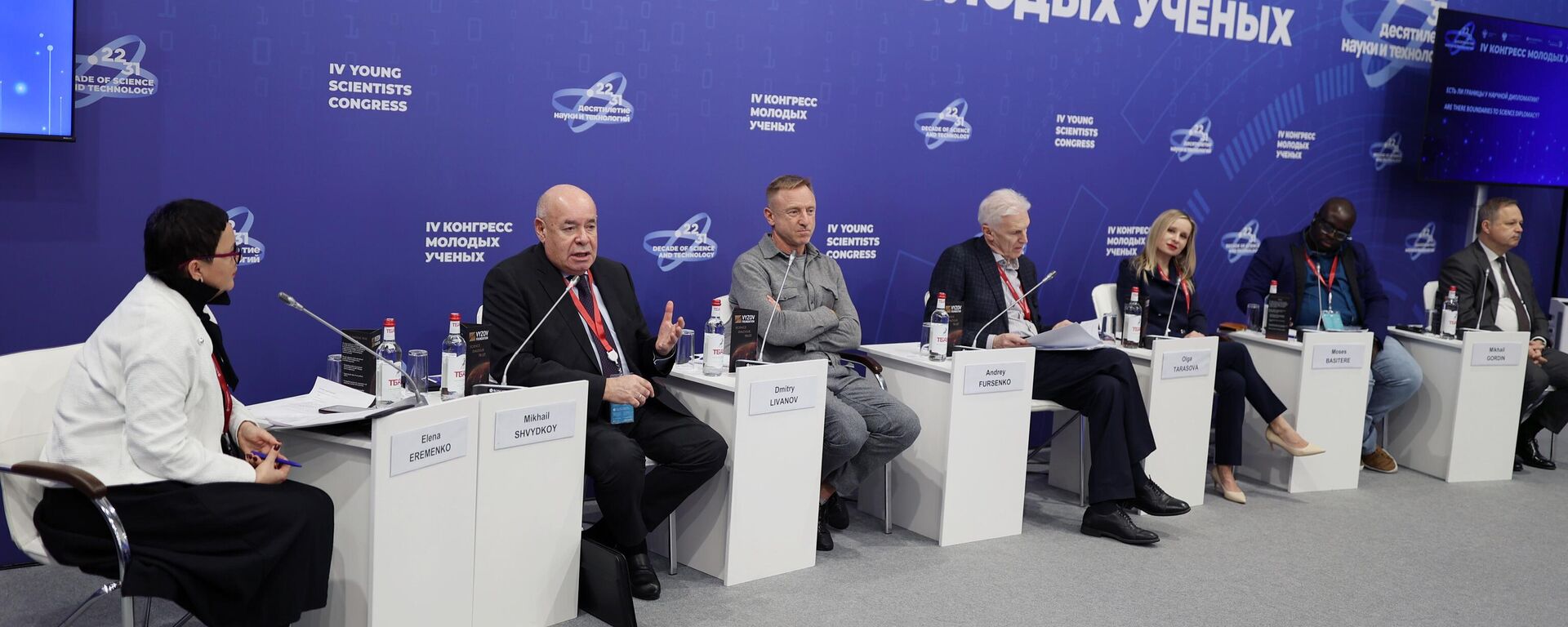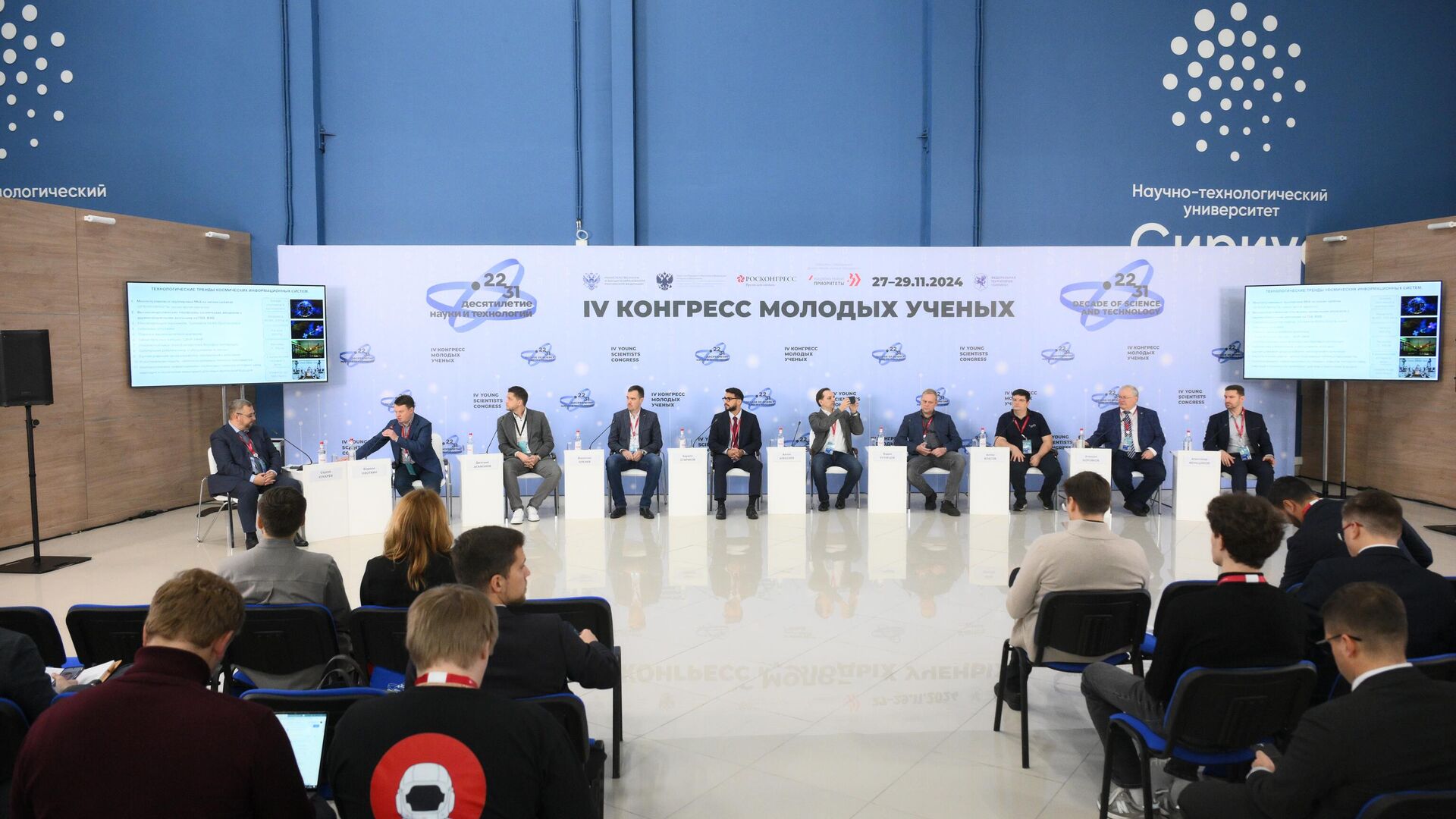https://sputnikglobe.com/20241127/exploring-the-future-of-space-russias-vision-for-a-seamless-digital-sky-1121030569.html
Exploring the Future of Space: Russia’s Vision for a Seamless Digital Sky
Exploring the Future of Space: Russia’s Vision for a Seamless Digital Sky
Sputnik International
On November 27, the session "The Frontiers of Sky and Near Space Exploration" at the IV Congress of Young Scientists discussed the technological challenges of building a seamless "digital sky" that connects data flows from low Earth orbits, lower altitudes, and ground infrastructure.
2024-11-27T10:10+0000
2024-11-27T10:10+0000
2024-11-28T17:38+0000
russia
russia
science & tech
moscow institute of physics and technology
st. petersburg state university
glonass
digital
digital infrastructure
4th young scientists congress
https://cdn1.img.sputnikglobe.com/img/07e8/0b/1c/1121030353_0:160:3072:1888_1920x0_80_0_0_b0b2492bc445fa1aa9d733b44ded9813.jpg
Experts highlighted that the developing concept of a "Digital Sky" would integrate existing technologies and platforms into a unified system, ensuring Russia's global leadership and technological sovereignty. Sergey Kukarev, director of aviation projects at Russian sat-nav firm GLONASS, noted that the exploration of the sky marks a shift from a horizontal land-based economy to a more vertical one, with the economy of lower altitudes and low Earth orbits expected to outpace terrestrial economic growth by 2035.The session also focused on two main questions: the research and technological frontiers of space exploration and the integration of different layers of technology, as well as key areas for cooperation. Kirill Okhotkin, director of space programs at the Moscow Institute of Physics and Technology, discussed trends in space information systems, including small satellite constellations on low orbits and high-energy platforms on geostationary and highly elliptical orbits.Dmitry Agafonov, deputy general director of Russian aerospace company "BUREAU 1440," emphasized that the "economy of the sky" would grow rapidly, with the company focusing on broadband satellite internet with global coverage as a key product. Likewise, Valentin Olenyev, director of aerospace research at St. Petersburg State University, spoke about ongoing efforts to develop a unified data exchange technology for all aerial vehicles, highlighting the need for industry-wide collaboration to tackle such challenges.Alexey Borovkov, vice-rector for digital transformation at Peter the Great St. Petersburg Polytechnic University, underscored the importance of optimizing processes in the age of drones and satellites, with a focus on modularity, unification, and digital certification. He emphasized the role of digital twins in unmanned aircraft systems, aiding in certification and real-time monitoring.In closing, moderator Sergey Kukarev urged for immediate and collective action to create a resilient, scalable, and updatable system for the future of aerospace technologies.The IV Congress of Young Scientists takes place from November 27-29 in Russia's Sirius federal territory. Part of the Decade of Science and Technology (2022-2031), the event brings together leading scientists, government officials, industry partners, and young researchers from Russia and abroad. Organized by the Roscongress Foundation, the Ministry of Science, and the Coordination Council for Youth Affairs in Science and Education, it highlights the achievements of the next generation of scientists.Sputnik is an official media partner of the event.
https://sputnikglobe.com/20241127/are-there-limits-to-science-diplomacy-1121030191.html
russia
Sputnik International
feedback@sputniknews.com
+74956456601
MIA „Rossiya Segodnya“
2024
Sputnik International
feedback@sputniknews.com
+74956456601
MIA „Rossiya Segodnya“
News
en_EN
Sputnik International
feedback@sputniknews.com
+74956456601
MIA „Rossiya Segodnya“
Sputnik International
feedback@sputniknews.com
+74956456601
MIA „Rossiya Segodnya“
russian congress of young scientists, science, scientists, digital development
russian congress of young scientists, science, scientists, digital development
Exploring the Future of Space: Russia’s Vision for a Seamless Digital Sky
10:10 GMT 27.11.2024 (Updated: 17:38 GMT 28.11.2024) On November 27, the session "The Frontiers of Sky and Near Space Exploration" at the IV Congress of Young Scientists discussed the technological challenges of building a seamless "digital sky" that connects data flows from low Earth orbits, lower altitudes, and ground infrastructure.
Experts highlighted that the developing concept of a "Digital Sky" would integrate existing technologies and platforms into a unified system, ensuring Russia's global leadership and technological sovereignty.
Sergey Kukarev, director of aviation projects at Russian sat-nav firm GLONASS, noted that the exploration of the sky marks a shift from a horizontal land-based economy to a more vertical one, with the economy of lower altitudes and low Earth orbits expected to outpace terrestrial economic growth by 2035.
The session also focused on two main questions: the research and technological frontiers of space exploration and the integration of different layers of technology, as well as key areas for cooperation. Kirill Okhotkin, director of space programs at the Moscow Institute of Physics and Technology, discussed trends in space information systems, including small satellite constellations on low orbits and high-energy platforms on geostationary and highly elliptical orbits.
Dmitry Agafonov, deputy general director of Russian aerospace company "BUREAU 1440," emphasized that the "economy of the sky" would grow rapidly, with the company focusing on broadband satellite internet with global coverage as a key product.
Likewise, Valentin Olenyev, director of aerospace research at St. Petersburg State University, spoke about ongoing efforts to develop a unified data exchange technology for all aerial vehicles, highlighting the need for industry-wide collaboration to tackle such challenges.
Alexey Borovkov, vice-rector for digital transformation at Peter the Great St. Petersburg Polytechnic University, underscored the importance of optimizing processes in the age of drones and satellites, with a focus on modularity, unification, and digital certification. He emphasized the role of digital twins in unmanned aircraft systems, aiding in certification and real-time monitoring.
In closing, moderator Sergey Kukarev urged for immediate and collective action to create a resilient, scalable, and updatable system for the future of aerospace technologies.

27 November 2024, 10:02 GMT
The IV Congress of Young Scientists takes place from November 27-29 in Russia's Sirius federal territory. Part of the Decade of Science and Technology (2022-2031), the event brings together leading scientists, government officials, industry partners, and young researchers from Russia and abroad. Organized by the Roscongress Foundation, the Ministry of Science, and the Coordination Council for Youth Affairs in Science and Education, it highlights the achievements of the next generation of scientists.



